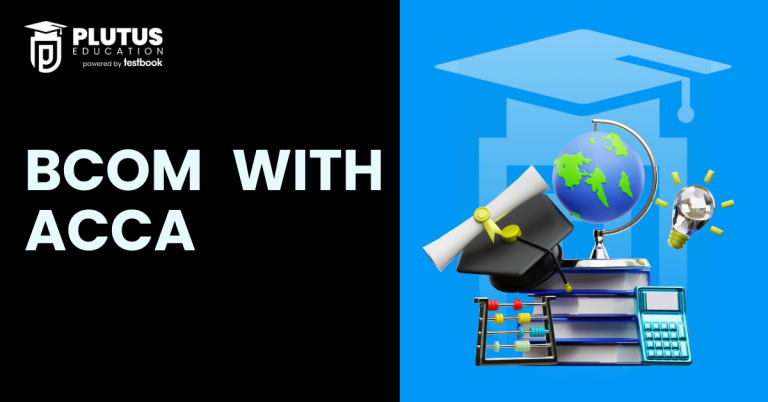The BCom with ACCA program is an innovative undergraduate course that blends a Bachelor of Commerce degree with ACCA’s globally accepted professional qualification. It helps students gain practical knowledge of international accounting and finance while earning a full-time degree. Within three to four years, students learn the basic concepts of business along with preparations for taking the ACCA exams, much of which will be embedded in their curriculum. This course is designed for those who want to get ahead in the job market, particularly for audit, finance, and consulting jobs, as it is the best option for those who want to work with multinational companies or pursue global careers.
BCom with ACCA: Course Highlights
BCom with ACCA offers dual benefits — an academic degree and a professional certification.Indeed, it opens the door to better job opportunities and provides exemptions for various ACCA examinations, making your journey much easier and faster. The program is spread across six semesters and provides flexibility in learning; thus, it is more expensive than a regular BCom course, but the return of investment is worth it in terms of better placements. Most of the colleges admit students based on merit or entrance examinations.
| Feature | Details |
| Full Form | Bachelor of Commerce (ACCA) |
| Course Level | Undergraduate + Professional Certificate |
| Duration | 3-4 years |
| Examination Type | Semester-Based |
| Eligibility | Minimum 50% in 10+2 from a recognized board |
| Admission Process | Entrance or Merit-Based, varies by college |
| Average Fees | INR 4-5 Lakhs (total for 3-4 years) |
| Job Roles | Accountant, Finance Analyst, Finance Manager, Auditor, Chartered Accountant |
| Top Recruiters | Axis Bank, HDFC Bank, Genpact, Reliance, Bosch, etc. |
BCom with ACCA Eligibility Criteria
To apply for the BCom with ACCA program, students need to meet certain minimum academic criteria. Most colleges follow a similar admission process, although there can be minor differences. The course is open to students from commerce and non-commerce backgrounds, provided they meet the grade requirements. Having a strong foundation in English and basic mathematics is considered beneficial. There’s no age bar, so even gap-year students can apply.
- 10+2 Passed: Students must have passed Class 12 from a recognized board like CBSE, ICSE, or State Boards.
- Minimum Marks: A minimum of 50% marks in the 10+2 examination is typically required.
- Stream: Preference is usually given to commerce students, but students from any stream can apply.
- No Age Limit: There is no maximum age limit, making it accessible for all eligible learners.
Some institutions may also ask for basic proficiency in English or conduct internal assessments.
BCom with ACCA Admission Process
Admission procedures for BCom with ACCA are similar to those of a normal BCom degree with the additional advantage of a global curriculum. The colleges assess the students through some of the following criteria: merit score, entrance exam performance, and consistency in academics. Some colleges may consider personal interviews or written assessments. Generally, applications for admission are accepted from March to July each academic year. Students must therefore monitor the official websites of individual colleges for specific timelines regarding admission.
Admission Considerations:
- Merit-Based Admission: Most colleges shortlist candidates based on Class 12 board exam scores.
- Entrance Exams: Some colleges conduct their own BCom or ACCA entrance exams.
- Personal Interview: Institutes may conduct interviews to assess communication and reasoning skills.
- Overall Profile: Extracurricular achievements, Olympiads, or commerce background can offer an advantage.
Make sure to apply early and prepare for both academics and soft skills evaluation.
BCom with ACCA Subjects and Syllabus
The BCom with ACCA syllabus is carefully structured to integrate standard commerce subjects with ACCA modules. Students learn accounting principles, taxation, management, and audit, along with globally accepted financial practices. This overlap helps in exempting up to 9 out of 13 ACCA papers. The curriculum ensures students become industry-ready by the end of their course.
Semester-Wise Subjects:
Semester 1
- International Financial Accounting: Teaches global accounting practices aligned with IFRS.
- International Management Accounting: Introduces budgeting, costing, and performance metrics.
- Environmental Studies: Builds awareness about sustainable business and ecological issues.
- Management Theory and Practice: Covers the basics of business operations and leadership roles.
Semester 2
- Performance Management: Focuses on cost control, budgeting, and business performance analysis.
- Financial Reporting: Teaches preparation and presentation of financial statements.
- Language Subject: Enhances communication skills and workplace fluency.
- Managerial Economics: Combines economics with business decision-making tools.
Semester 3
- Audit & Assurance: Trains students to understand audit processes and internal controls.
- International Financial Management: Discusses global markets, currency exchange, and trade.
- Strategic Business Reporting: Introduces higher-level financial reporting and analysis.
- Computer Applications in Business: Focuses on accounting software and digital finance tools.
Semester 4
- Governance, Risk, and Ethics: Builds knowledge about ethical business practices and compliance.
- Business Strategy & Analysis: Develops strategic thinking and competitive analysis skills.
- E-Commerce: Teaches digital business models and online transaction systems.
- Business Mathematics: Applies statistical tools and mathematics in financial decisions.
Semester 5 & 6 (Advanced Level)
- Advanced Performance Management I & II: Focuses on strategic cost and performance management.
- Advanced Financial Management I & II: Deals with investment decisions and corporate finance.
- Income Tax & GST: Introduces tax systems and application in real business scenarios.
- HRM & Corporate Law: Prepares students for roles in compliance and legal governance.
- Business Environment & Duty Principles: Explains market forces and regulatory frameworks.
ACCA Exemptions in BCom with ACCA
One of the biggest advantages of choosing BCom with ACCA is the exemption from 9 ACCA papers. Since the course is integrated, many subjects are directly mapped with ACCA modules. This makes it easier for students to complete the ACCA qualification after graduation. The remaining four professional-level papers can be pursued during or after the final year of BCom, significantly reducing time and effort.
Exempted ACCA Papers:
- F1 – Business and Technology: Covered through subjects like Organisation Management and Principles of Management.
- F2 – Management Accounting: Matched with basics of cost accounting and performance management modules.
- F3 – Financial Accounting: Directly aligned with Financial Accounting taught in the first semester.
- F4 – Corporate and Business Law: Exempted based on Business Law subject in BCom.
- F5 – Performance Management: Covered by Performance Management I & II in later semesters.
- F6 – Taxation: Topics from Income Tax and GST help secure this exemption.
Papers You Still Need to Attempt:
- F7 – Financial Reporting: Focuses on complex reporting standards and principles.
- F8 – Audit and Assurance: Teaches students to conduct and evaluate audits independently.
- F9 – Financial Management: Covers capital budgeting, risk management, and finance theory.
These remaining papers form the foundation for strategic-level ACCA exams.
BCom with ACCA Colleges in India
Several reputed institutions across India offer the BCom with ACCA course. These colleges have structured their syllabus in collaboration with ACCA to help students get maximum exemptions and industry exposure. The colleges differ in terms of infrastructure, fee structure, location, and placement assistance. Choosing a reputed college helps you get better internships, faculty support, and ACCA training.
Top Colleges Offering BCom with ACCA:
| College Name | Average Annual Fees (INR) |
| Jain University, Bangalore | ₹1,65,000 |
| GCEC Jaipur | ₹1,09,000 |
| Yenepoya University | ₹95,000 |
| Srinivas University | ₹80,000 |
| Kristu Jayanti College, Bangalore | ₹80,000 |
| St. Joseph’s College of Commerce | ₹1,35,000 |
| ISBR College | ₹3,00,000 |
| Christ College, Pune | ₹3,00,000 |
| Sophia College | ₹34,700 |
| VidyaBharathi Group of Institutions | ₹80,000 |
Popular Cities and Colleges:
Bangalore: Known for Kristu Jayanti, St. Joseph’s, and ISBR — all offering top-notch infrastructure and ACCA-integrated curriculums.
Mangalore: Jain University and Yenepoya University offer this program with practical ACCA training support.
Kerala: Rajagiri College and VidyaBharathi institutions are preferred for affordability and solid faculty.
Hyderabad: GITAM, Loyola Academy, and St. Ann’s are great choices with strong placement support.
Delhi NCR: Sharda, Ansal, and Apeejay universities are known for modern campuses and global collaborations.
BCom with ACCA: Course Comparison
Many students get confused between BCom with ACCA and other combinations like BCom with CS or BBA with ACCA. While all these programs have their pros and cons, BCom with ACCA tends to be more aligned with commerce careers. Here’s a detailed comparison.
BCom with ACCA vs BCom with CS:
| Criteria | BCom + ACCA | BCom + CA |
| Certification | Global (ACCA – UK) | National (ICAI – India) |
| Duration | 3 years | 4.5 years |
| Eligibility | 50% in 12th | 45% in 12th |
| Average Fees | ₹4–5 Lakh | ₹3,000 – ₹1 Lakh |
| Career Path | Audit, Finance, Tax, MNC Roles | Accounting, taxation, audit but in Indian domain |
BCom with ACCA vs BBA with ACCA:
- BBA is more theory-focused, which makes the technical preparation for ACCA exams tougher.
- BCom covers core ACCA topics like Taxation, Financial Reporting, and Audit, helping students get more exemptions.
- BCom offers better alignment with accounting principles, which reduces study pressure during ACCA preparation.
In most cases, BCom with ACCA is the more efficient and practical route for aspiring global finance professionals.
BCom with ACCA: Scope and Career Growth
The BCom with ACCA program prepares students for immediate employment upon their graduation and lays the platform for higher studies. Upon graduation, one can go for specialized master’s programs or join the workforce. The added value of the qualification through ACCA is substantial, especially for roles in multinational corporations.
Higher Education Options:
- M.Com: Great for students who want to deepen their accounting and finance knowledge.
- MBA: Ideal for those looking at leadership, consulting, or entrepreneurship roles.
- CFA: Best suited for careers in investment banking and portfolio management.
- FRM: Perfect for those aiming at risk management positions in banks and corporates.
Students also explore study opportunities abroad, thanks to the global credibility of ACCA.
BCom with ACCA: Job Roles and Salary
Graduates of BCom with ACCA enjoy strong employability in top companies across finance, audit, consulting, and accounting. The course not only helps you build technical knowledge but also improves your communication, analytics, and problem-solving skills — all of which are key to landing high-paying jobs.
Popular Job Roles & Salary Ranges:
| Job Role | Job Description | Avg. Salary (INR) |
| Financial Accountant | Handles company finances, creates reports, ensures accuracy | ₹5–10 LPA |
| Senior Auditor | Leads audit teams, ensures compliance and accuracy in accounts | ₹6–10 LPA |
| Chartered Accountant | Manages tax, accounting, and strategic finances for businesses | ₹9–15 LPA |
| Account Executive | Coordinates with clients, manages accounts and collections | ₹2–10 LPA |
| Data Analyst | Analyzes business data to help in strategic decisions | ₹4–7 LPA |
| Operations Manager | Supervises HR, recruitment, and training processes | ₹4–10 LPA |
Salaries vary based on city, experience, and company. Freshers in metros often start with ₹4–6 LPA.
ACCA with Plutus Education
Learn from ACCA Certified experts to excel in your career. Enroll in the ACCA Success Path – Complete Certification program at Plutus Education. Start your journey towards ACCA today!
Advantages of Completing your ACCA journey with us:
Unlock industry-recognized certification with comprehensive ACCA training
Master ACCA concepts with over 1000+ hours of interactive learning
Prepare for ACCA exams with comprehensive support and practical insights
Transform your career with practical ACCA skills, expert mentorship, and placement support
Achieve ACCA success with comprehensive study resources and sessions
Become an ACCA-certified professional with our industry-focused curriculum and placement assistance
FAQs
Can I do ACCA and BCom together?
Yes, you can pursue ACCA and BCom together, and that’s exactly what the BCom with ACCA program is designed for. It allows you to study commerce subjects while completing ACCA papers in parallel. Most colleges integrate 6–9 ACCA exams within the BCom syllabus. This reduces your study load and saves time compared to pursuing them separately.
What are the benefits of BCom with ACCA?
This course provides you with a globally recognised professional qualification alongside your academic degree. It offers 9 paper exemptions in ACCA, reducing effort and costs. You get access to better job roles, global opportunities, and higher starting salaries. It also saves you the time and stress of preparing for ACCA independently.
What is the meaning of BCom with ACCA?
BCom with ACCA refers to a Bachelor of Commerce degree that includes the ACCA curriculum integrated into its syllabus. You study core BCom subjects while simultaneously preparing for ACCA certification. The course is ideal for students aspiring to build careers in finance, audit, accounting, and consulting — both in India and abroad.
Which BCom degree is best for ACCA?
BCom (Accounting and Finance) or BCom (Professional) with ACCA are the most suitable options. These streams have maximum overlap with ACCA subjects, helping students get the highest number of exemptions. Colleges offering official ACCA tie-ups also ensure better training support.
Is B.Com with ACCA difficult?
BCom with ACCA can be challenging but manageable with consistent study. The integrated model means you don’t need to prepare separately for ACCA, which reduces pressure. Regular classes, assignments, and mock tests make it easier for students to grasp both academic and professional content.
What is the salary of ACCA?
After completing ACCA, professionals earn between ₹6 to ₹19 LPA in India, depending on their role and experience. Globally, ACCA members earn higher, especially in countries like the UK, UAE, and Singapore. BCom with ACCA graduates typically start around ₹4–8 LPA in India.
Is ACCA easy to pass?
ACCA is considered easier than CA but still requires consistent effort and understanding. Global pass rates range from 45% to 55% per paper. With proper coaching, preparation, and practice, students can clear exams smoothly, especially when they’re part of a structured BCom with ACCA program.


